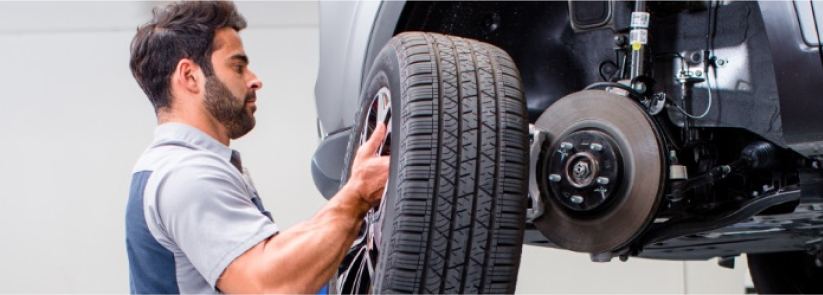Get Road-Ready with Expert GMC Tires Service at Morris Tires
Get Road-Ready with Expert GMC Tires Service at Morris Tires
Blog Article
Tire Service: The Influence of Climate Condition
When it involves guaranteeing optimal performance and security when traveling, comprehending the effect of climate condition on tire service is vital. From scorching heat to icy roadways, each climate aspect can dramatically influence tire capability and total driving experience. By delving right into the effects of differing weather condition problems on tires, chauffeurs can gain beneficial understandings that may boost their automobile's performance and longevity. In this discussion, we will certainly discover the elaborate relationship between climate condition and tire solution, clarifying the importance of weather-specific tire upkeep practices and considerations.
Warmth and Tire Efficiency
When revealed to high temperature levels, tires experience changes in efficiency that can significantly impact automobile safety and security and handling. The warmth produced from long term driving or warm weather condition problems creates the tire rubber to soften, leading to minimized walk life and enhanced wear.

Winter Effects
Cold weather condition conditions can have a substantial influence on tire performance and security. As temperatures decline, tire rubber can solidify, resulting in lowered grip on icy or snow-covered roads. In winter, tires may likewise lose atmospheric pressure a lot more swiftly, which can influence dealing with and gas effectiveness. Additionally, cool temperature levels can cause tire sidewalls to stiffen, increasing the risk of damage from holes or other roadway hazards.
To minimize the results of winter on tires, it is crucial to frequently inspect tire stress and inflate them to the producer's suggested levels. Making use of wintertime or all-season tires made for cool climate problems can additionally enhance grip and grip on icy or snowy roadways. Appropriate tire maintenance, including regular inspections for wear and damages, ends up being much more critical during colder months to guarantee optimum performance and safety.
Rainy Conditions Impact
Tires with damaged footsteps are a lot more vulnerable to hydroplaning, where a layer of water constructs up in between the road and the tire surface, leading to loss of grip. To battle this, vehicle drivers ought to on a regular basis examine their tires for sufficient tread deepness and think about spending in tires particularly designed for damp conditions.
Additionally, stormy weather condition can additionally reduce presence, making it testing for vehicle drivers to see the road ahead plainly (GMC Tire Service). In such conditions, it is vital to readjust driving rates accordingly and keep a risk-free adhering to distance to enable for abrupt stops. Properly inflated tires can likewise assist in preserving control on damp roadways by supplying far better handling and hold
Snow and Tire Safety And Security
Snow-covered roadways pose unique obstacles for vehicle drivers, emphasizing the importance of correct tire option and upkeep. When driving in snowy problems, having the right tires can make a substantial difference in security and performance. Wintertime tires are created with special rubber compounds and step patterns to provide much better traction on snow and ice compared to all-season tires. The much deeper treads and sipes of winter months tires help grip the roadway much better, minimizing the danger of sliding and sliding.

In addition, chauffeurs must take into consideration setting up tire chains in extreme snowy conditions. Tire chains give extra traction by clutching the snow and ice, boosting security and control. Nonetheless, it is crucial to comply with supplier instructions when mounting and using tire chains to stop damages to the tires and automobile. By selecting the appropriate tires, keeping correct inflation, and considering read review added traction aids Recommended Reading like tire chains, chauffeurs can enhance their safety when navigating snow-covered roads.
Weather-Related Tire Upkeep
When faced with different climate problems, appropriate tire upkeep comes to be an important aspect of car safety and performance. Weather-related tire maintenance incorporates a variety of practices aimed at ensuring optimal tire feature and long life in various climate scenarios. One crucial element of weather-related tire maintenance is tire stress guideline. Varying temperatures can create tire stress to differ, affecting traction and gas effectiveness. On a regular basis examining and readjusting tire pressure according to maker referrals is essential for risk-free driving in altering weather. Furthermore, tire tread depth plays a considerable role in managing different weather condition aspects. Tires with sufficient walk depth give far better grip on wet or icy roads, reducing the danger of skidding or hydroplaning. Checking tire walk consistently and replacing tires when walk wear reaches a certain depth is crucial for maintaining traction and stability in negative climate. By prioritizing weather-related tire maintenance, chauffeurs can boost safety and security, boost lorry performance, and prolong the lifespan of their tires.
Conclusion
In final thought, climate conditions have a considerable influence on tire performance and safety and security. From heat affecting tire pressure and wear to cold weather condition minimizing traction, it is crucial to think about the weather condition find this when preserving and making use of tires.
In this discussion, we will explore the detailed connection between climate problems and tire service, losing light on the value of weather-specific tire upkeep techniques and factors to consider.

Report this page